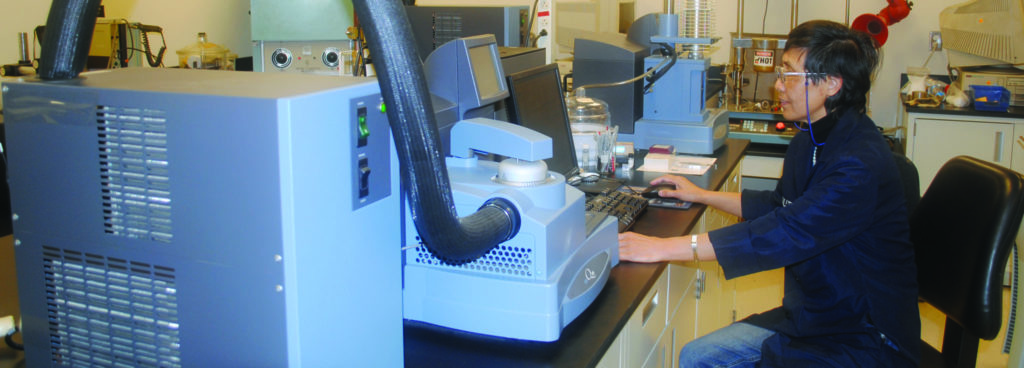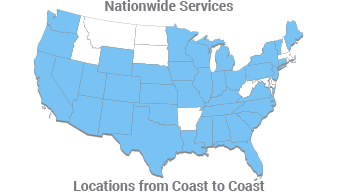- Home
- Services/IndustriesServicesindustries
- About Us
- LocationsStatesAccordion ContentAccordion ContentAccordion ContentAccordion Content
- Job Openings
- Quick Links
- ATS Family

DSC Analysis
DSC is an acronym that stands for Differential Scanning Calorimetry. DSC analysis is a technique used to determine what happens to polymers when heated. This particular technique is used to measure thermal transitions which are changes that take place when you heat a polymer. Examples of these changes are melting point, glass transition temperature, specific heat capacity and heat of transition determinations.
How Does DSC Analysis Work?
DSC testing allows you to measure the rate of heat flow in a sample in relation to an empty reference pan. The DSC heats two pans, a sample pan containing your sample and an empty reference pan. The DSC is then programmed to heat both pans at a specific rate, usually 10°C or 20°C/minute. The sample pan will require more heat to keep it heating at the same rate as the empty reference pan because it contains more material. This difference in the amount of heat is what the DSC measures. When polymers melt they absorb heat and therefore this is called an endothermic reaction whereas a curing reaction gives off heat and is considered an exothermic reaction.
The types of materials that are commonly examined during DSC analysis are typically polymers. The properties measured are:
- Melting Point
- Heat of Fusion
- Curing Reaction Times
- Polymer Crystallinity
- Heat Capacity
What is the Goal?
At Applied Technical Services, our comprehensive DSC analysis services are designed to help you accomplish a number of unique goals in the most comprehensive and cost effective ways possible. These include:
- Performing a complete analysis of the properties in question, looking for things such as proper melting temperature, reaction energy and temperature, crystalline phase transition, specific heat or heat capacity, oxidation induction times and more
- Verifying that your materials meet the thermal properties of your specifications and to characterize these properties to ascertain what impact they have on the performance of your samples
Applied Technical Services’ DSC analysis is also inherently customizable, allowing us to provide each client a unique service designed to address the needs of their own specific projects. Temperatures can range anywhere from sub-ambient to 725 degrees Celsius. Atmospheres can include nitrogen, oxygen, and controlled mixed gases. Sample sizes can range from 0.5mg to 100mg.
ATS' Chemical Analysis Services
At Applied Technical Services, our goal is to provide you with all of the complete, actionable DSC analysis services that you need to make informed, safe decisions moving forward. If your organization is in need of a DSC analysis services provider that you know you can depend on to get the job done right the first time, don’t delay – contact Applied Technical Services today.

Request Form
"*" indicates required fields
Chemical Analysis
- Ash Testing
- Azo Dyes
- Azo Dye Testing
- Benzene Analysis
- Biocompatibility Testing for Medical Devices ISO 10993
- Chemical Composition Testing Lab
- Cleanliness Testing Lab
- Contamination Test
- Combustion Analysis
- CPSIA Testing Lab
- DSC Analysis
- DSC Analysis of Polymers
- DSC Polymer Characterization Analysis
- DSC Testing
- Ethylene Oxide GC MS Analysis
- EPA Method 24 Testing
- Extractables Leachables Testing
- Extractables Testing
- Flame Retardant Chemicals
- Formaldehyde Testing
- FTIR Analysis
- FTIR Chemical Analysis
- FT-IR Material Analysis
- FTIR Surface Analysis
- FTIR Testing
- Gas Chromatography Mass Spectrometer Analysis
- GCMS Analysis and Testing
- GCMS Oil Analysis
- Halide Anion Testing
- HPLC Analysis Services
- ICP-AES Analysis
- ICP-OES Testing
- ION Chromatography Testing
- ISO 10993 Testing
- ISO 10993 Testing Lab
- Karl Fischer Testing
- Leachable Testing
- LECO Testing
- Melting Point Analysis
- Methane Analysis Gas Chromatography
- Methanol Contamination Testing
- OES Materials Testing
- Optical Emission Spectroscopy
- PAH Testing
- Particle Size Distribution Analysis
- Particle Size Distribution Analysis Laboratory
- Particle Size Distribution Testing
- PFOA Testing
- PFOS/PFOA Testing
- Plastic Impact Testing
- Plastic Pipe Testing
- Polymer Characterization Lab
- Polymer Material Testing
- Polymer Testing and Analysis
- Powder Characterization
- Product Formulation
- Solvent Testing Lab
- TGA Analysis
- TGA DSC Analysis Lab
- TGA Moisture Analysis
- TGA Polymer Testing
- Thermal Analysis Services
- UV VIS Testing
- VDA 19.1 Cleanliness Testing Lab
- Ventilator Component Cleanliness Testing
